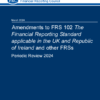
by John McCarthy Consulting Ltd. | May 4, 2021 | Blog, News
Readers of our regular blog will be delighted to hear that our new Anti-Money Laundering & Terrorist Financing Policies Controls & Procedures Manual is just published and available here on our website for immediate download. This is the first available 2021 AML Manual for Accountants on the Irish market.
The Manual follows the enactment of the Criminal Justice (Money Laundering and Terrorist Financing) Acts 2010 to 2021 which has come into effect on two dates:
- 23 April 2021 for all parts of the Act except Section 8 dealing with express trusts; and
- 24 April 2021 – Section 8 is enacted requiring express trusts to keep a beneficial ownership register.
In future blogs we will look at various parts of the new and existing provisions of this legislation.
For more blogs please visit this link and for our publications and manuals and services click here.

by John McCarthy Consulting Ltd. | Apr 13, 2021 | Blog, News
In our last blog, we mentioned the enactment of the latest AML legislation in Ireland which is the ‘Criminal Justice (Money Laundering and Terrorist Financing) (Amendment) Act, 2021’. In the coming weeks we are going to take a look at the various provisions of the new legislation.
Among the provisions of the new Act is one that amends Schedule 4 of the Act of 2010 to specify further red flags, for transactions that could pose a higher risk of money laundering and/or terrorist financing. The 2021 law is yet to be commenced by statutory instrument.
A higher risk is posed where:
- a customer is a third-country national who applies for residence rights or citizenship in the State in exchange for capital transfers, purchase of property or government bonds, or investment in corporate entities in the State;
- a product, service, transaction or delivery channel involves the use of non-face-to-face business relationships without the use of certain safeguards such as electronic identification means, relevant trust services or other secure, remote or electronic, identification processes that are officially regulated, recognised, approved or accepted;
- a transaction relates to oil, arms, precious metals, tobacco products, cultural artefacts and items of archaeological, historical, cultural and religious importance, or of rare or scientific value, including ivory and protected species.
For more blogs please visit this link and for our publications and manuals and services click here.

by John McCarthy Consulting Ltd. | Apr 6, 2021 | Blog, News
Are your engagement letters up to date? Probably not!
No sooner had we given our letters of engagement on the website a refresh for Spring 2021, than the Government passed into law the latest anti-money laundering legislation. The Criminal Justice (Money Laundering and Terrorist Financing) (Amendment) Act 2021 which is number 3 of 2021 was passed into law on 18 March 2021. It awaits commencement by the Minister.
Once it comes into force it will replace the earlier Criminal Justice (Money Laundering and Terrorist Financing) Acts, 2010 to 2018. The new title of the Irish anti-money laundering legislation is the ‘Criminal Justice (Money Laundering and Terrorist Financing) Acts 2010 to 2021’.
The new legislation primarily deals with cryptocurrency, virtual asset providers (VASPs) and estate agents letting property for €10,000 per month or more, high value art dealers and tax advisers (extending the scope of persons who fall within the definition of ‘tax adviser’), among other matters. Previous legislation only dealt with estate agents buying/selling property.
Readers please note that you will need to change the references on your letters of engagement to ‘Criminal Justice (Money Laundering and Terrorist Financing) Acts 2010 to 2021’ with immediate effect and update AML Manuals and training etc.
A later blog will go into more detail about the changes.
At www.jmcc.ie we have refreshed all of our letters or engagement templates for these references and we keep adding new templates which may be viewed at this link.
by John McCarthy Consulting Ltd. | Mar 5, 2019 | Blog, News

In spite of efforts to make UK registered companies disclose their ownership through the people with significant control (PSC) register, thousands of companies don’t comply with the rules brought in to counter fraud and money laundering.
According to a 2018 Freedom of Information request to Companies House by Fortytwo Data (now Napier), over 57,000 UK businesses are not yet compliant with new regulations.
Similar requirements are in the process of being introduced in Ireland, called the Beneficial Ownership Register to be maintained by the Companies Registration Office (CRO), as part of the enforcement of the EU Fourth AML Directive.
It is a criminal offence not to follow the PSC/Beneficial Ownership requirements, with potential sanctions including fines for the companies involved and up to two years in prison for the culpable individuals.
PSCs/Beneficial Owners, are natural persons who own directly or indirectly at least 25% of a company’s shares or control at least 25% of its voting rights, or have control over appointments to the board of directors.
The PSC/Beneficial Ownership Registers are designed to reduce the ability of money launderers to hide and funnel their ill-gotten gains, using apparently legitimate corporate structures.
For more up to date information on developments in company law and anti-money laundering, visit the new online webinar training section of our website. Once viewing is completed customers will receive a CPD Certificate confirming their learning.

by John McCarthy Consulting Ltd. | Nov 1, 2016 | News
‘The specialist nature of the knowledge and services provided by the accountancy service providers makes them vulnerable to being sought out and exploited by those who seek to launder the proceeds of crime or evade tax. It is recognised in international risk-based guidance that accountancy service providers may be sought to assist in the structure and design of transactions intended to conceal the nature and origin of funds.’
So says the first ever National Risk Assessment published jointly in October 2016 by the Department of Justice and Equality (DoJE) and the Department of Finance. The assessment covers the main risk areas of the many sectors in Ireland that are subject to the provisions of the Criminal Justice (Money Laundering and Terrorist Financing) Act, 2010.
The report identifies the fact that very few (80 out of a total of 21,682 AML reports) suspicious transaction reports (known as STRs) were made by the accountancy profession, according to a separate report called the 2015 Annual Report on Money Laundering and Terrorist Financing from the DoJE, given the size of the sector. As a result, (among other risk factors) the sector is assessed as Medium-High risk.
Among the accountancy services identified, by the National Risk Assessment report as vulnerable to the risk of money laundering and terrorist financing are:
- Company and trust formations;
- Insolvency services;
- Providing financial advice;
- Providing tax advice;
- Handling client money;
- Managing client assets and financial accounts;
- Investment business services;
- Auditing financial statements; and
- Company secretarial services.
This first ever National Risk Assessment has been produced ahead of the international inspection of Ireland being carried out by the FATF in December 2016 called the Mutual Evaluation Review. This review can have significant international positive or negative reputational impact potential for Ireland as a financial centre, in a post-Brexit world.
To hear more about how to be on the alert for suspicions of money laundering and terrorist financing under the Criminal Justice (Money Laundering and Terrorist Financing) Act, 2010, come to our next AML course on Monday 28 November 2016.










